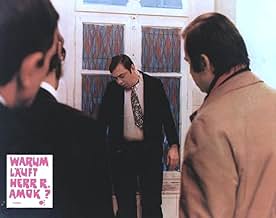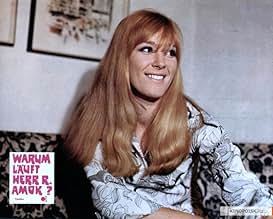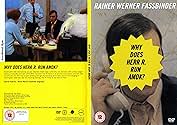Pourquoi monsieur R. est-il atteint de folie meurtrière?
With slicked-down hair and three-piece suits, dependable Herr Raab is a technical draftsman. He gets along with his colleagues although his boss wants him to go beyond technical cleanliness ... Read allWith slicked-down hair and three-piece suits, dependable Herr Raab is a technical draftsman. He gets along with his colleagues although his boss wants him to go beyond technical cleanliness to problem solving. He's a dutiful husband; his wife's a social climber and pushes him to ... Read allWith slicked-down hair and three-piece suits, dependable Herr Raab is a technical draftsman. He gets along with his colleagues although his boss wants him to go beyond technical cleanliness to problem solving. He's a dutiful husband; his wife's a social climber and pushes him to seek a promotion, but they also share sweet moments. He's a caring father, helping his son... Read all
- Directors
- Writers
- Stars
- Awards
- 3 wins & 2 nominations total
- Kollege im Büro
- (as Harry Bär)
- Opa Raab
- (as Herr Sterr)
- Oma Raab
- (as Frau Sterr)
- Schallplattenverkäuferin
- (as Carla Aulaulu)
- Directors
- Writers
- All cast & crew
- Production, box office & more at IMDbPro
Featured reviews
From the beginning he is simply not there, as Patrick Bateman would put it. When his colleagues make jokes, he walks with them, but not laughs with them. When his wife brings a friend, we see his narrow-mindedness. She is self-assured and liberal with no clue of what to do with her life, something Kurt is unable to understand. He needs order. He is order. He trys to have everything perfect in his sense, he works technically perfect like a machine, but lacks (human) ideas, or tries to cure his son's speech problems, but he always fails.
His system of perfection does not work. He does not work. And it keeps going on. You see Kurt in different allday situations, where he doesn't behave (all too) strange in a obvious way. But watch him more carefully and you see that he's empty. He holds down all emotions. In a banal situation, when he sees that his life is not perfect at all, and unable to adjust his system to the others like he always was, he tries to make his life perfect by eliminating all disturbing factors. He runs amok. And he does so as he always did: Emotionless.
What Fassbinder wants to show us, is what lies beneath the human fassade. We never know what a person really thinks or feel, because we're all masters of disguise and on the other hand unable or unwilling to find out (another) one's real feelings. And that can be dangerous.
Highly sensitively Fassbinder gives insight into the life of a man that runs amok. Fassbinder succeeds in showing the motives of a crazy amok run.
If you don't know any of Fassbinders movies you must be aware that this is different than anything you know. Fassbinder portrays a man that lacks self-awareness and is poor of showing his emotions and who does not do more than he is asked for in his job. Herr R. is slow in mind and words. And yet, all that does not accumulate to his amok run. What does is hidden behind a surface that Fassbinder discloses one by one... 9 out of 10.
The film consists largely of lengthy conversations about the most mundane of things; work, vacations, the son's school, buying a romantic record in a music store... The whole picture is also presented exclusively with long takes and hand-held cameras. The improvised nature of the conversations further adds to the strictly realist documentary-like feel of the movie, as does the intentionally dull cinematography. With such undramatic direction, the only detail to suggest the advancement of Mr. R.'s emotional alienation is Kurt Raab's subtle performance: Mr. R. alternates between sullen observing and unrestrained blabbing, and when the camera occasionally focuses on his face instead of his chit-chatting friends, one can get a creepy feel of slowly escalating anxiety inside him. Lilith Ungerer as his wife also displays faint hints of similar emotions, but keeps them tightly hidden under her shell of excruciating normalcy.
When a film is titled like this one, some kind of dramatic ending or plot twist can be expected sooner or later. Here it only happens at the very end; until the last 10 minutes or so, the film is completely G-rated. The scene preceding the twist is the best one in the whole film and achieves a very distressing atmosphere, but still, the twist itself comes across as rather predictable and even lackluster. Perhaps it is just that modern audiences have become desensitized to such incidents, but more oomph would have been needed to justify the preceding 80 minutes of practically nothing, as Mr. R.'s boredom has also become ours by the end.
Even though there's not much to see besides the lead couple's performance, I have a taste for this type of uneventful, talky cinema. Ultimately Warum... was a curious novelty to me and kept me intrigued throughout, but I'm somewhat wary of recommending it to more casual film fans; something like Michael Haneke's 71 Fragments of a Chronology of Chance could be a more easily accessible take on the subject. Then again, if you know what to expect, Warum... may also be a rewarding experience in mundanity that many can surely identify with – you have to make up your own mind based on your tastes.
Although Fassbinder is credited as writing and directing this film, it has since come to light that he probably did neither. The writing was largely improvisation, and the directing was exclusively Michael Fengler (a longtime Fassbinder collaborator).
Frankly, I am glad that this is not a real Fassbinder because he makes some excellent movies... but, for me, this would not be one of them. It just runs on, with people rambling for the entire duration. The reviews tend to be positive, but I see it as a film where nothing happens. And not in a funny way, just in a very pointless way.
Did you know
- TriviaIn 2003 on a interview for Village Voice Hanna Schygulla claimed that this film was completely done by director Michael Fengler, whereas purported co-director Rainer Werner Fassbinder had nothing to do with the actual film. She also claimed that film was almost completely improvised which wasn't Fassbinder's way to make movies. Fassbinder still is credited as director and writer on the actual film and on many official sources, including Fassbinder Foundation's website. This fact has been confirmed by Michael Fengler himself in the 2008 documentation Gegenschuss - Aufbruch der Filmemacher (2008). He reported, that Fassbinder was involved neither in writing nor in directing of the movie and has visited the movie set at most twice during shooting.
- GoofsWhen Herr R. leaves the doctor the camera team can be seen in the mirror on the wall.
- ConnectionsFeatured in Sehnsucht nach Sodom (1989)
- How long is Why Does Herr R. Run Amok??Powered by Alexa
Details
- Release date
- Country of origin
- Language
- Also known as
- Why Does Herr R. Run Amok?
- Filming locations
- Müllerstraße 40, Munich, Bavaria, Germany(bureau, Franz Maron, Architekt/Dipl. Ing.)
- Production companies
- See more company credits at IMDbPro
Box office
- Budget
- DEM 135,000 (estimated)
- Runtime1 hour 28 minutes
- Sound mix
- Aspect ratio
- 1.37 : 1
Contribute to this page






























